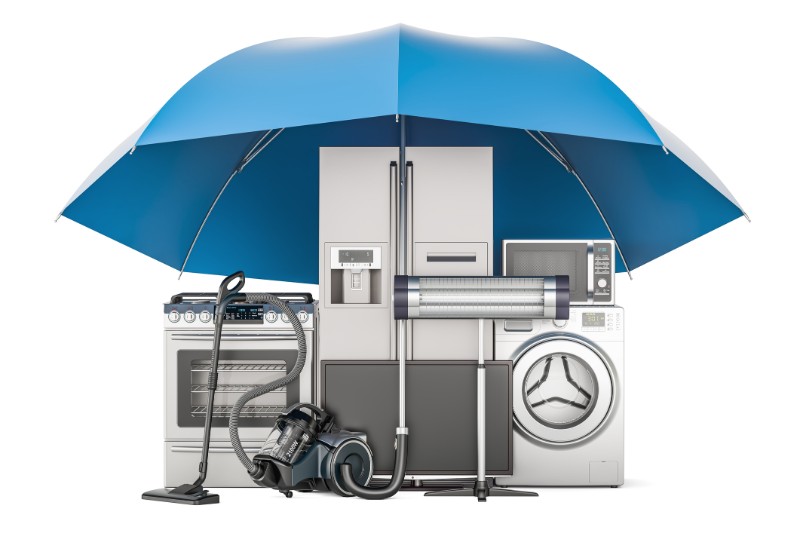
No matter what the home inspection says, and no matter that you’re holding homeowners insurance, most everyone has a nagging fear when buying a home.
What secrets does the house harbor? What have we missed? Why did we get such a good deal?
Hopefully, a buyer won’t have the same luck as the bargain-hunting suckers in the 1986 comedy “The Money Pit.” In it, the buyers, played by Tom Hanks and Shelley Long, experience a litany of catastrophic problems with their newly-purchased upstate New York home. In one scene alone, the plumbing delivers a viscous glop instead of water to a bathtub, the front door frame falls to the ground (door and all), the grand staircase collapses, and the couple discovers a raccoon living in the dumbwaiter. Later, the electrical wiring goes up in flames, a chimney collapses, and that bathtub decides to, um, move down a floor without the assistance of a contractor.
Nightmares like this might make a home warranty an appealing addition to your home.
What is a home warranty?
You’re familiar with warranties on many things you buy — like your car and your smartphone. A home warranty is similar.
“In a nutshell, it’s a policy you pay for that covers the cost of repairing many of your home appliances if they break down,” according to Realtor.com.
Homeowners insurance, by contrast, covers the structure of the house and its contents in the event of theft, fire or other catastrophe. But it doesn’t cover those contents’ failure.
Most typically, home warranties will cover the house’s big infrastructure systems — heating and cooling, electrical, and plumbing — and the big appliances like the refrigerator, washer, and dryer if they stop doing their jobs.
Such warranties are readily available from a dozen or more reputable companies. And they’re typically affordable, at least relative to the cost of the house. Basic policies may set you back $300, while more comprehensive ones might climb to $2,000. So it’s tempting to add a warranty from the get-go unless you’re buying a brand new home, which is unlikely to have major systems failures and quite likely to have appliances covered under manufacturer warranties.
Not so fast
But before signing up for a policy, realize this handful of caveats.
First, you lose a bit of the voice in choosing who’ll work on your home. The insurance company usually chooses the servicer from a pre-approved list. So, no bargain hunting.
Second, you’ll still be out-of-pocket for some cash when you start a claim. That contractor will charge a service fee, and that’s your responsibility to pay.
Third, the plans have a finite lifespan. This will differ from policy to policy, so make sure you understand the term of coverage before you buy.
Fourth, there’s a long list of problems and appliances it won’t cover. Got a second story space that’s cooled by a window-unit air conditioner? Those aren’t usually covered. Let’s run down the list of woes from “The Money Pit,” which may help you get a clearer picture:
- Glop in the plumbing: This is usually covered
- Front door frame collapse: Nope.
- Staircase collapse: Nope.
- Raccoon in the dumbwaiter: No way.
- Electrical wiring on fire: Covered.
- Chimney collapse: Nope.
- Bathtub falling through a ceiling: Nope.
Some of those events would be covered by your homeowner’s insurance, but you can see that a warranty policy would do little to keep you in the black for most of those nightmare calamities. And the raccoon infestation is totally going to be on your tab.
There’s a healthy stack of complaints from unhappy people who say they have to wage a battle to get a claim approved. The list of cons is so great that some experts advise against home warranties in almost every instance.
“Home warranties aren’t worth the paper they’re written on,” says Clark Howard, a financial expert, and consumer advocate. “If something goes wrong in your home, the warranty companies are brutally difficult to deal with.”
When they’re a lifesaver
Clarks’ perspective is important, but it’s a bit too black-and-white. There are many people who have benefited from home warranties. A plumbing system may pass muster on inspection before a home closes, but that doesn’t mean the pipes didn’t have undetectable cracking that manifests itself into a flooded basement six months down the road.
And the nation’s leading warranty provider says it pays out an average of $1 billion in claims a year, so while some people might have bad experiences, clearly not everyone does.
And there’s a case when even cranky Mr. Clark agrees that a home warranty is a good idea: When a seller purchases the policy for the buyer to grant them peace of mind.
Put yourself in the buyer’s shoes. All other things being equal between two houses, would you rather buy the one that has a warranty covering it or one that doesn’t? All exclusions and claim-grievances aside, it’s just good marketing for an adept seller.
What about me?
Still on the fence about whether or not you need a home warranty in your specific case? Talk to your Realtor about it. One worth his or her snuff will give you good advice for both your home’s scenario and your financial situation. They may even have a recommendation on a good provider if you decide you do want a warranty.
And in the greater Atlanta area, Carter & Associates wants to be that real estate firm helping you with the decision. Please get in touch with us if we can help keep you from falling into a money pit.
